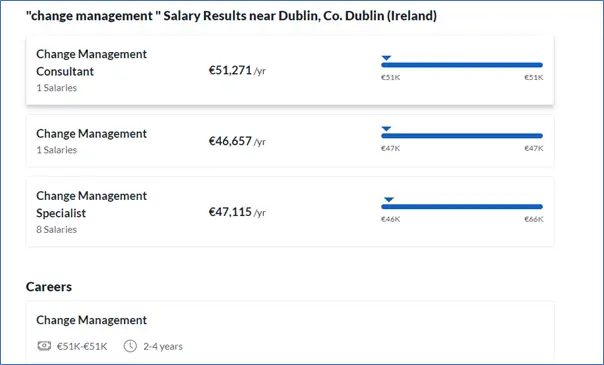- Why Change Management?
- Course Overview
- Career Opportunities
- Entry Requirements
Why Change Management?
Change and development are an integral feature of modern businesses. Making changes (often fundamental ones) in how business is conducted is necessary to cope with its ever changing competitive environment.
Change management is the process of guiding organisation through this period of transition, whether the change is localised to a particular part of the organisation or changes the organisation as a whole. Many change management projects have limited success. Therefore, it is important that all members, and especially the change leader, have the appropriate knowledge and skills to help ensure a successful transition and adapt to the inevitable challenges their change project will encounter.
Change management roles are increasingly in demand in Ireland and overseas. From LinkedIn data, there are currently 656 job openings for change management roles. Recent data from Indeed shows 3535 job openings for change management roles. Glassdoor has 3852 job openings for the change management role.
This Diploma of Change Management is ideally suited for those who are:
- Developing and leading a change programme in their organisation.
- Involved in change management programmes within their organisation.
- Already working in dynamic and fast-moving organisations and want to learn more about how organisations facilitate and implement change to consistently achieve their business mission.
- Eager to work in change management analyst roles in the future.
Salaries are competitive for these roles:

Course Overview
In this programme you will learn how to identify the need for change management in an organisation and structure and implement a change management programme to optimise the opportunities for sustained long-term changes.
The specific topics are as follows:
Understanding and recognising the need for change
- Aligning with company strategy
- Internal and external drivers
Organisational experiences of change
- Case studies
Managing change, theory in practice
- The Change-Curve Model
- Lewin’s Change Model
- McKinsey’s 7-S Model
- Kotter’s 8-step Theory
Stakeholder engagement in change management
- Monitoring the impact of change on employees, teams and the organisation as a whole
Managing barriers
- Structural, resourcing, equipment
Managing resistance to change
- Emotional and behavioural reactions to change
- The human nature factor
Embedding a culture of change in an organisation
- Building and maintaining trust
- Building a culture of continuous improvement
Leading a Change Management project
- The role of the leader
- Creating a vision for change
- Guiding principles for leading changes
- Key attributes of a strong change manager and leader
- Lifecycle of a successful change project
Assessment
The programme is assessed by project work, applying the tools and techniques of change management to real-life examples of change projects within the workplace.
What is a Professional Diploma?
An IBAT Professional Diploma is a focused, short duration practical course that consolidates, upskills and/or reskills learners in a professional area. They are stand-alone qualifications that do not lead to an award on the National Framework of Qualifications (NFQ).
Career Opportunities
Entry to this programme is based on each applicant’s own merits and work experience. No prior academic qualification or professional experience in change management is required.
The roles involved in change management depend on numerous factors, including the size and type of organisation.
Possible careers within this field include:
Change Manager
The job role of the change manager is the most common in the domain, it’s their job is to ensure change initiatives meet the project objectives adhering to time and budget. Also, includes employee usage and adoption. They must possess a thorough knowledge of industries implementing a change process.
Responsibilities:
- Assessing the impact of change.
- Supporting the communication efforts
- Taking the lead of the change management activities
- Applying the structured methodology to the projects.
Change Management Consultant
The role of a Change Management consultant includes acknowledging the area that requires the need for the change and how it affects the organisation’s processes.
Responsibilities:
- Leading change management projects. For instance- it includes starting a project from scratch, i.e., researching, implementing, and assessing it.
- Gaining a thorough understanding of sales prospects and initiatives. Also, being a part of internal sales meetings.
- Assisting colleague engagement programs to accomplish internal change management.
A group of professionals who approve changes. Also, they assist in scheduling and assessing the changes. When choosing CAB members, it has to be ensured that both technical and business perspectives are considered.
CAB (Change Advisory Board) Members
Responsibilities:
- They take a glance through the review record for improved accuracy and completeness.
- They ensure that they consider vendor and customer viewpoints.
- Also, they provide input to the change manager to maintain and improve the change management process.
Entry Requirements
While no prior academic qualification or professional experience is required to participate in this programme.
Please note: Visas are not offered for any of our diploma courses.
Why Study at IBAT Dublin?
We are Ireland’s leading enterprise-focused third level institution with a special focus on how we guide, support, and mentor our students throughout their college experience and into their working lives.
We know that employers need graduates that can hit the ground running, so we’ve tailored our courses to prepare you to do just that. And if you need an extra hand, our Academic team equipped with years of lecturing and industry experience are ready to support you both in your professional and personal development.
Diverse Programmes
Take your pick of our wide range of courses, each designed with your future in mind.
Expert Tutors
Learn from industry professionals at the very top of their game.
Flexible Learning
Life happens. We get it. Study and achieve your goals on your schedule.
Central Location
Study at one of our two campuses placed in the heart of central Dublin.
Small Class Sizes
Get one-to-one, personalised support from our tutors.

Meet Our Students
Hear from our students as they share why they chose IBAT Dublin and the invaluable benefits they’ve gained from their journey with us.
Study options
You can attend lectures Online or On Campus, offering maximum flexibility with your time and how you learn.









